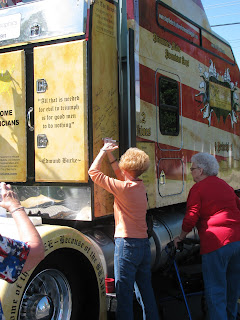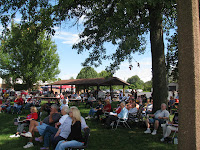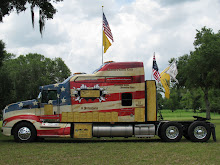The company to whom we are leased and specifically Todd Haerr not only authorized the time off but made a special effort to help us arrive there in time to get the truck ready for the event. Thanks Todd.
We got to the St Louis area on Friday morning, we went to my mother's place south east about 50 miles and spent Friday working on and cleaning the truck to get it ready. I also had a great visit with my mother as Tina did with her family.
Early Saturday morning we got up and headed back north to Collinsville to the American Legion Hall. What a great group of Veterans there is at that hall. The memorial out front of this hall is amazing. I neglected to get pictures but it was and is one of the nicest I have seen.

The event started at about 1400 with some young ladies called the Gateway Girls singing and dancing for the crowd. I actually compiled the following video from many clips shot on that day. They didn't just stand and sing for 12 minutes or so, they would sing, then a speaker would babble on about something and they would sing some more. Here is the video of their songs on that day.
.
After the star Spangled Banner was performed by these amazing young ladies Mike Ortiz, a Tea Party Organizer and 9/12 organizer and conservative blogger from Danville Il, spoke to the crowd about the NRA's recent capitulation on the 1st amendment and then He spoke about what is known as "The National Popular Vote" Mike's speech is below in it's entirety.
We had another speaker who spoke about constitutional law but his was more of a hawk for his personal website than a speech about the constitutionality of what is going on in America so I chose not to include it here, nor will I mention his name or website. I believe he is a hindrance to the conservative movement and certainly to constitutional law. I just don't believe He knows more about the constitution than David Barton of WallBuilders does but he certainly made some disparaging remarks about Mr. Barton who wasn't there to defend himself. It is certainly easy to attack what someone says or their person when they aren't there to defend themselves. Just another shameless, slimy attorney looking to make a name for himself. I will not be a party to furthering his cause, which seems to be Himself.
After my sister spoke for a few more minutes it was my turn. I was asked to speak about activism and activism with honor. My speech, in it's 3 part, 20 minute, entirety follows.
After the singing and dancing, the speaking and babbling was all said and done we mingled and had some great visitation and fellowship. I so love being around folks of like mind and those who are working towards the same goal... that being, Stopping the Destruction of America.
Here are a few pictures of some of the folks who attended and some of those who signed the 9/12 Truck. The first two here are family members of Tina's. The lady in the red top is an avid reader of my pointless ramblings, she is Tina's Aunt Marlene. The second lady here, in the peach colored top, a life long Democrat, is one of Tina's cousins, Janet.


Speaking of attorney's, here is Carment Durso of Durso Law Offices in Belleville IL. Another of St Claire Counties finest and most loyal Dems at a Tea Party. Carmen is a very good friend of mine and my mother's employer. He has been very good to my mother so what could I possibly say that might be bad about a guy like that...Democrat attorney or not.

Below are pictures of Josh, a brother to the Gateway Girl with whom he is pictured. These are some amazing kids. Their parents have obviously spent numerous hours teaching them right from wrong, good from bad, and that hard work will always conquer an apathetic, lethargic attitude.


Finally, a few pictures of the crowd.



Just another quick note here about a lady we met at this rally. her name is Marcia Fish and she is director of an organization called Mission of Moms. This is an amazing organization driven by donations. If you can see your way to helping this organization, Marcia and especially the troops in theater would be most appreciative.
In the mean time...Here is a novel item for the coming election year.
When The Politicians Are On TV, Blowing Hot Air And You Want To Scream, Just Grab Your Doll And Give It A Fling, Let Them Know...Hey, You Work For Me.
BACK BY POPULAR DEMAND
A useful, bipartisan doll to give you something to throw while watching the news and listening to the politicians lie with every motion of their lips. Throw your doll and scream while never causing any damage to your television. These dolls now come with a retrieval string for retrieval without moving from your perch on the couch.
All Dolls are bipartisan, Republican on 1 side, Democrat on the other.
In closing, we hope that you can find it in your budget to help with a small purchase or a donation in support of our mission.
 We have launched into a couple of apparel stores so that everyone can show their support of the 912 Truck. Click here to show your support, or go to www.printfection.com/912truck. For those of you that would rather have a hat or mug you we have another outlet at cafepress.com/912 Truck. You can also use any of the donate buttons on this page to make a contribution directly to our endeavor to Waking up America.
We have launched into a couple of apparel stores so that everyone can show their support of the 912 Truck. Click here to show your support, or go to www.printfection.com/912truck. For those of you that would rather have a hat or mug you we have another outlet at cafepress.com/912 Truck. You can also use any of the donate buttons on this page to make a contribution directly to our endeavor to Waking up America.Thanks for your support.
In God I Trust
Have a Great Day and a Better Tomorrow
ADW



State-by-state winner-take-all laws to award electoral college votes were eventually enacted by 48 states AFTER the Founding Fathers wrote the Constitution.
ReplyDeleteThe Founding Fathers only said in the U.S. Constitution about presidential elections (only after debating among 60 ballots for choosing a method): "Each State shall appoint, in such Manner as the Legislature thereof may direct, a Number of Electors . . ." The U.S. Supreme Court has repeatedly characterized the authority of the state legislatures over the manner of awarding their electoral votes as "plenary" and "exclusive."
Neither of the two most important features of the current system of electing the President (namely, universal suffrage, and the 48 state-by-state winner-take-all rule) are in the U.S. Constitution. Neither was the choice of the Founders when they went back to their states to organize the nation's first presidential election.
In 1789, in the nation's first election, the people had no vote for President in most states, Only men who owned a substantial amount of property could vote.
In 1789 only three states used the state-by-state winner-take-all rule to award electoral votes.
The winner-take-all rule is not entitled to any special deference based on history or the historical meaning of the words in the U.S. Constitution. The current 48 state-by-state winner-take-all rule (i.e., awarding all of a state's electoral votes to the candidate who receives the most popular votes in a particular state) is not mentioned in the U.S. Constitution, the debates of the Constitutional Convention, or the Federalist Papers. The actions taken by the Founding Fathers make it clear that they never gave their imprimatur to the winner-take-all rule.
The constitutional wording does not encourage, discourage, require, or prohibit the use of any particular method for awarding the state's electoral votes.
As a result of changes in state laws enacted since 1789, the people have the right to vote for presidential electors in 100% of the states, there are no property requirements for voting in any state, and the state-by-state winner-take-all rule is used by 48 of the 50 states.
The current system of electing the president ensures that the candidates, after the primaries, do not reach out to all of the states and their voters. Candidates have no reason to poll, visit, advertise, organize, campaign, or care about the voter concerns in the dozens of states where they are safely ahead or hopelessly behind. The reason for this is the state-by-state winner-take-all rule (not mentioned in the U.S. Constitution, but now used by 48 states), under which all of a state's electoral votes are awarded to the candidate who gets the most votes in each separate state.
ReplyDeletePresidential candidates concentrate their attention on only a handful of closely divided "battleground" states and their voters. In 2008, candidates concentrated over two-thirds of their campaign events and ad money in just six states, and 98% in just 15 states (CO, FL, IN, IA, MI, MN, MO, NV, NH, NM, NC, OH, PA, VA, and WI). 19 of the 22 smallest and medium-small states (with less than 7 electoral college votes) were not among them. Over half (57%) of the events were in just four states (Ohio, Florida, Pennsylvania and Virginia). In 2004, candidates concentrated over two-thirds of their money and campaign visits in five states; over 80% in nine states; and over 99% of their money in 16 states, and candidates concentrated over two-thirds of their money and campaign visits in five states and over 99% of their money in 16 states.
Two-thirds of the states and people have been merely spectators to the presidential elections.
Policies important to the citizens of ‘flyover’ states are not as highly prioritized as policies important to ‘battleground’ states when it comes to governing.
Because of the state-by-state winner-take-all electoral votes laws (i.e., awarding all of a state’s electoral votes to the candidate who receives the most popular votes in each state) in 48 states, a candidate can win the Presidency without winning the most popular votes nationwide. This has occurred in 4 of the nation's 56 (1 in 14) presidential elections. Near misses are now frequently common. A shift of 60,000 votes in Ohio in 2004 would have defeated President Bush despite his nationwide lead of 3,500,000 votes.
The National Popular Vote bill would guarantee the Presidency to the candidate who receives the most popular votes in all 50 states (and DC).
ReplyDeleteEvery vote, everywhere, would be politically relevant and equal in presidential elections. Elections wouldn't be about winning states. Every vote would be counted for and directly assist the candidate for whom it was cast. Candidates would need to care about voters across the nation, not just undecided voters in a handful of swing states.
The bill would take effect only when enacted, in identical form, by states possessing a majority of the electoral votes--that is, enough electoral votes to elect a President (270 of 538). When the bill comes into effect, all the electoral votes from those states would be awarded to the presidential candidate who receives the most popular votes in all 50 states (and DC).
The bill uses the power given to each state by the Founding Fathers in the Constitution to change how they award their electoral votes for president. It does not abolish the Electoral College.
The bill has been endorsed or voted for by 1,922 state legislators (in 50 states) who have sponsored and/or cast recorded votes in favor of the bill.
The powers of state governments are neither increased nor decreased based on whether presidential electors are selected along the state boundary lines, along district lines (as has been the case in Maine and Nebraska), or national lines.
In Gallup polls since 1944, only about 20% of the public has supported the current system of awarding all of a state's electoral votes to the presidential candidate who receives the most votes in each separate state (with about 70% opposed and about 10% undecided). The recent Washington Post, Kaiser Family Foundation, and Harvard University poll shows 72% support for direct nationwide election of the President. Support for a national popular vote is strong in virtually every state, partisan, and demographic group surveyed in recent polls in closely divided battleground states: Colorado-- 68%, Iowa --75%, Michigan-- 73%, Missouri-- 70%, New Hampshire-- 69%, Nevada-- 72%, New Mexico-- 76%, North Carolina-- 74%, Ohio-- 70%, Pennsylvania -- 78%, Virginia -- 74%, and Wisconsin -- 71%; in smaller states (3 to 5 electoral votes): Alaska -- 70%, DC -- 76%, Delaware --75%, Maine -- 77%, Nebraska -- 74%, New Hampshire --69%, Nevada -- 72%, New Mexico -- 76%, Rhode Island -- 74%, and Vermont -- 75%; in Southern and border states: Arkansas --80%, Kentucky -- 80%, Mississippi --77%, Missouri -- 70%, North Carolina -- 74%, and Virginia -- 74%; and in other states polled: California -- 70%, Connecticut -- 74% , Massachusetts -- 73%, Minnesota -- 75%, New York -- 79%, Washington -- 77%, and West Virginia- 81%.
Most voters don't care whether their presidential candidate wins or loses in their state . . . they care whether he/she wins the White House. Voters want to know, that even if they were on the losing side, their vote actually was counted and mattered to their candidate.
The National Popular Vote bill has passed 31 state legislative chambers, in 21 small, medium-small, medium, and large states, including one house in Arkansas (6), Connecticut (7), Delaware (3), The District of Columbia (3), Maine (4), Michigan (17), Nevada (5), New Mexico (5), New York (31), North Carolina (15), and Oregon (7), and both houses in California (55), Colorado (9), Hawaii (4), Illinois (21), New Jersey (15), Maryland (10), Massachusetts (12), Rhode Island (4), Vermont (3), and Washington (11). The bill has been enacted by Hawaii, Illinois, New Jersey, Maryland, Massachusetts, and Washington. These six states possess 73 electoral votes -- 27% of the 270 necessary to bring the law into effect.
See http://www.NationalPopularVote.com
The 11 most populous states contain 56% of the population of the United States and a candidate would win the Presidency if 100% of the voters in these 11 states voted for one candidate. However, if anyone is concerned about this theoretical possibility, it should be pointed out that, under the current system, a candidate could win the Presidency by winning a mere 51% of the vote in these same 11 states -- that is, a mere 26% of the nation's votes.
ReplyDeleteWith National Popular Vote, big states that are just about as closely divided as the rest of the country, would not get all of the candidates' attention. In recent presidential elections, the 11 largest states have been split -- five "red states (Texas, Florida, Ohio, North Carolina, and Georgia) and six "blue" states (California, New York, Illinois, Pennsylvania, Michigan, and New Jersey). Among the four largest states, the two largest Republican states (Texas and Florida) generated a total margin of 2.1 million votes for Bush, while the two largest Democratic states generated a total margin of 2.1 million votes for Kerry.
In 2004, 8 small western states, with less than a third of California’s population, provided Bush with a bigger margin (1,283,076) than California provided Kerry (1,235,659).
With National Popular Vote, big cities would not get all of candidates’ attention, much less control the outcome.. The population of the top five cities (New York, Los Angeles, Chicago, Houston and Philadelphia) is only 6% of the population of the United States and the population of the top 50 cities (going as obscurely far down in name recognition as Arlington, TX) is only 19% of the population of the United States. Cleveland and Miami certainly did not receive all the attention or control the outcome in Ohio and Florida in 2000 and 2004. A "big city" only campaign would not win.
For example, in California state-wide elections, candidates for governor or U.S. Senate don't campaign just in Los Angeles and San Francisco, and those places don't control the outcome (otherwise California wouldn't have recently had Republican governors Reagan, Dukemejian, Wilson, and Schwarzenegger). A vote in rural Alpine county is just an important as a vote in Los Angeles.
If the National Popular Vote bill were to become law, it would not change the need for candidates to build a winning coalition across demographics. Any candidate who yielded, for example, the 21% of Americans who live in rural areas in favor of a "big city" approach would not likely win the national popular vote. Candidates would still have to appeal to a broad range of demographics, and perhaps even more so, because the election wouldn't be capable of coming down to just one demographic, such as voters in Ohio.